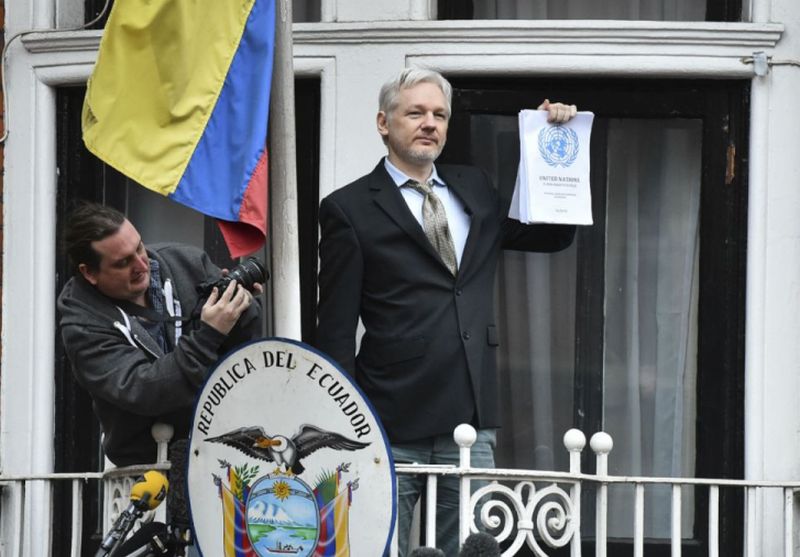WikiLeaks founder Julian Assange said Friday authorities responsible for his arbitrary detention could face criminal charges, in the wake of a landmark investigation into his case by a United Nations panel
“Inevitably, those people will face the consequences of their actions,” he said, warning international humanitarian law could be applied to his case if he isn’t immediately released.
The WikiLeaks founder further argued the U.N. panel’s decision is “legally binding,” and condemned the British and Swedish governments for rejecting the body’s verdict.
“The UK lost. Sweden lost. They lost at the highest level,” he said.
Responding directly to comments from the UK’s foreign ministry made hours earlier, Assange said the UK government could have appealed the panel’s ruling.
“They then had an opportunity to appeal. The UK did not appeal, Sweden did not appeal,” he said.
Assange continued, “Why? Because they knew they would lose. Because there are no grounds for appeal.”
Outside the embassy, WikiLeaks supporters cheered, chanting, “we love you,” and, “Julian, your friends are here!”
Assange responded by thanking his supporters, including the government of Ecuador. The South American nation has granted Assange asylum.
The mood outside the embassy had been celebratory since the U.N. panel, the Working Group on Arbitrary Detention released the findings of an investigation into Assange’s case. The investigation concluded Assange has been arbitrary detained by both the UK and Sweden, and called for his immediate release and “compensation”.
Assange’s lawyer Melinda Taylor described the verdict as a “damning indictment” of the U.K. and Sweden’s treatment of Assange.
The verdict “dispels the myth that Assange is a fugitive from justice,” she told a press conference.
Summarizing the WGAD’s findings, Taylor said the U.N. body had identified five key reasons Assange’s detention had been deemed unjust.
She said WGAD pointed to Assange’s inability to see case files, along with the length of his detention without trial, the indefinite nature of his detention and the basic conditions of his confinement in the Ecuadorean embassy. In particular, she noted the embassy wasn’t equipped with medical supplies. The lawyer also highlighted the WGAD’s finding the warrant for Assange should no longer be applicable under technical grounds.
Both Sweden and the U.K. were quick to reject the U.N.’s findings.
“Mr Assange has chosen, voluntarily, to stay at the Ecuadorian Embassy and Swedish authorities have no control over his decision to stay there. Mr Assange is free to leave the Embassy at at any point. Thus, he is not being deprived of his liberty due to any decision or action taken by the Swedish authorities. The government there refutes the opinion of the working group,” read a statement by Sweden’s ambassador to the U.N. that was shared by BuzzFeed.
Meanwhile, the U.K. said in a statement that the ruling “changes nothing.”
“We completely reject any claim that Julian Assange is a victim of arbitrary detention. The U.K. has already made clear to the U.N. that we will formally contest the working group’s opinion.”
During a press conference at the Frontine Club, Assange responded by arguing both Sweden and the UK were involved in the WGAD’s proceedings for months. He argued the governments had ample time to appeal.
Both governments had a two week period to appeal the WGAD’s decision. That period ended Friday.
“You can’t decide that you’re going to recognize a forum … and then at the end when you don’t like the outcome because you have been breaking the law, come out with press statements that say ‘Well, we disagree,” Assange said.
The decision by the U.N. body comes after a complaint filed by Assange in 2014, arguing that the police presence outside the Ecuadorean embassy in London and the threats of arrest amounted to arbitrary detention.
Assange wrote Wednesday that he would accept the U.N. ruling regardless of the outcome, accepting arrest if necessary but added that, “should I prevail and the state parties be found to have acted unlawfully, I expect the immediate return of my passport and the termination of further attempts to arrest me.”
44-year-old Assange has been held up in the Ecuadorean Embassy in London since June 2012 after he secured political asylum from Quito.
Taken from www.telesurtv.net/english
 Escambray ENGLISH EDITION
Escambray ENGLISH EDITION






Escambray reserves the right to publish comments.